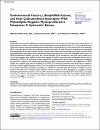Environmental Factors, Lifestyle Risk Factors, and Host Characteristics Associated With Philadelphia Negative Myeloproliferative Neoplasm: A Systematic Review
Date
2021Metadata
Show full item recordAbstract
Myeloproliferative neoplasms (MPNs) are clonal hematopoietic stem cell disorders characterized by the overproduction of mature myeloid cells and are often associated with an acquired genetic mutation of Janus Kinase2V617F. Various epidemiological studies have indicated associations between environmental factors, lifestyle factors, and host characteristics with developing MPNs. This review aims to collect and summarize the existing information on these risk factors and establish their association with pathogenesis MPNs. Medline, Embase, PubMed, and grey literature were systematically searched using key terms for MPNs, and epidemiological study designs, that is, cross-sectional studies, case-control, and cohort, that investigated the risk factors for MPNs published were identified. Out of the 4621 articles identified, 20 met the selection criteria and were included in this review. Heterogeneity, study reliability, and bias were assessed. A significant association was found between smoking and the development of MPNs. This relationship has been explained by the substantial increase in several proinflammatory mediators and systematic oxidative stress causing hyperstimulation of myeloid compartments leading to the development of MPNs. Obesity was modestly linked with an increased risk of MPNs. The underlying mechanisms have been linked to changes in endocrine, metabolic, and inflammatory systems. No strong association was found between exposure to hazardous substances, that is, benzene and MPNs, but further investigation on the effects of increased levels and duration of exposure on hematopoietic stem cells will be beneficial. Unique individual and host variations have been determined as a modifier of disease pathogenesis and phenotype variations. There is a higher incidence rate of females developing MPNs, specifically ET, than males with higher PV incidence. Therefore, gender contributes to the heterogeneity in myeloproliferative neoplasm. Studies identified as part of this review are very diverse. Thus, further in-depth assessment to explore the role of these etiological factors associated with MPNs is warranted.
Collections
- Pharmacy Research [1426 items ]


